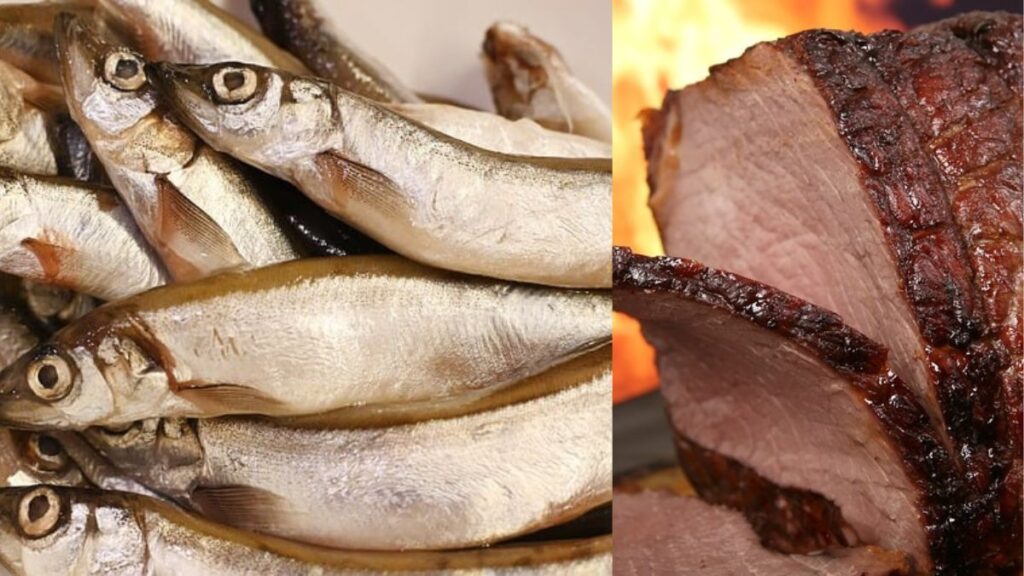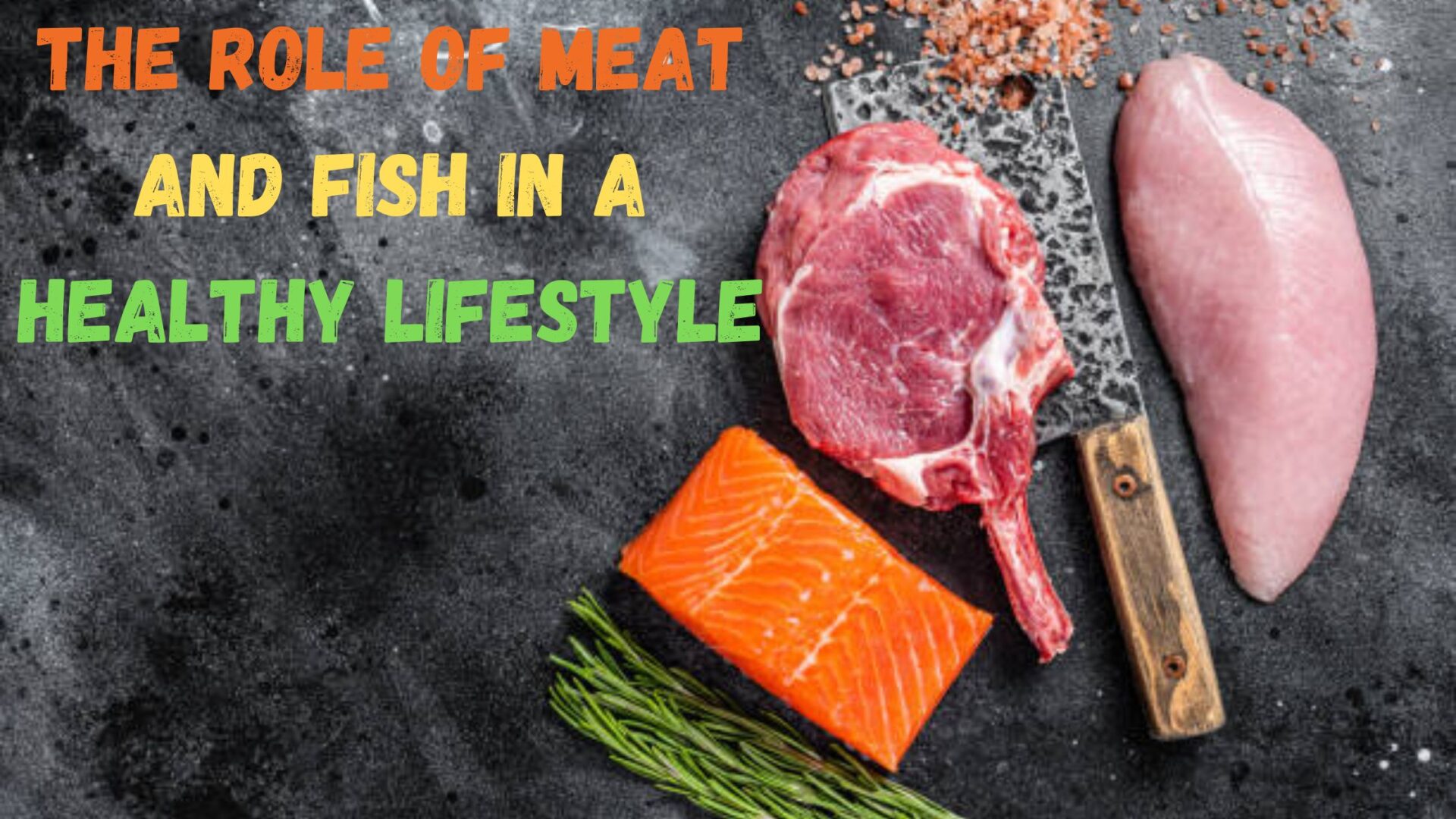Introduction:-
“Unlocking Wellness: The Crucial Role of Meat and Fish in Cultivating a Healthy Lifestyle”

In today’s fast-paced world, achieving and maintaining wellness is a top priority for many individuals. While various factors contribute to overall well-being, one often overlooked aspect is the role of diet, particularly the inclusion of meat and fish. In this article, we’ll explore how incorporating these protein-rich foods into your diet can unlock the door to a healthier lifestyle.
Understanding the Essentials: The Role of Meat and Fish in a Healthy Lifestyle
Meat and fish are powerhouse sources of essential nutrients that play key roles in supporting overall health. They are rich in high-quality proteins, vitamins, and minerals vital for various bodily functions. From iron and zinc to vitamin B12 and omega-3 fatty acids, these nutrients are essential for energy production, immune function, brain health, and more.
Protein Powerhouses:
Protein is a fundamental building block of the body, crucial for the growth and repair of tissues. Meat and fish are excellent sources of complete proteins, meaning they contain all nine essential amino acids that the body cannot produce on its own. Incorporating adequate protein into your diet not only supports muscle development and maintenance but also helps keep you feeling full and satisfied, which can aid in weight management.
Heart-Healthy Omega-3s:
Fish, in particular, is renowned for its abundance of omega-3 fatty acids, such as EPA and DHA. These fatty acids are known for their heart-healthy benefits, including reducing inflammation, improving blood lipid levels, and lowering the risk of cardiovascular disease. Regular consumption of fatty fish like salmon, mackerel, and trout can significantly contribute to overall heart health and well-being.
Nutrient Diversity:
One of the key advantages of incorporating a variety of meats and fish into your diet is the diverse array of nutrients they provide. For example, lean cuts of poultry offer a lean source of protein, while beef and pork provide essential vitamins like iron and zinc. Similarly, different types of fish offer unique nutritional profiles, ensuring you receive a wide range of essential nutrients with each meal.
Balancing Act:
While meat and fish offer numerous health benefits, balance is key. It’s essential to choose lean cuts of meat and incorporate a variety of fish into your diet to minimize saturated fat intake and maximize nutrient diversity. Additionally, opting for grilled, baked, or steamed preparations over fried options can further enhance the healthfulness of your meals.
Why does our body need fish and meat?
Our bodies require fish and meat for several reasons, primarily due to the rich array of nutrients they provide:

- Protein: Fish and meat are excellent sources of high-quality protein, which is crucial for building and repairing tissues, including muscles, organs, and skin. Protein is also essential for producing enzymes and hormones, as well as supporting immune function.
- Essential Amino Acids: Both fish and meat contain all nine essential amino acids that the body cannot produce on its own. These amino acids are necessary for various physiological processes and must be obtained through dietary sources.
- Vitamins: Fish and meat are rich in vitamins such as B vitamins (including B12, B6, niacin, and riboflavin), which play vital roles in energy metabolism, nerve function, and red blood cell formation. Vitamin B12, in particular, is found almost exclusively in animal-derived foods and is essential for neurological health.
- Minerals: These foods are also significant sources of essential minerals like iron, zinc, selenium, and phosphorus. Iron is crucial for transporting oxygen in the blood, while zinc supports immune function and wound healing. Selenium acts as an antioxidant, protecting cells from damage, and phosphorus is essential for bone health and energy metabolism.
- Omega-3 Fatty Acids: Fatty fish, such as salmon, mackerel, and sardines, are particularly rich in omega-3 fatty acids, specifically EPA (eicosapentaenoic acid) and DHA (docosahexaenoic acid). These fatty acids are essential for brain health, cardiovascular health, and reducing inflammation in the body.
- Creatine: Meat, especially red meat, is a significant source of creatine, a compound important for providing energy to muscles during high-intensity activities. Creatine supplementation has been shown to improve exercise performance and may have neurological benefits as well.
- Satiety: Protein and fat found in fish and meat can help promote feelings of fullness and satiety, which can be beneficial for weight management and controlling food intake.
While fish and meat provide essential nutrients, it’s important to consume them as part of a balanced diet that includes a variety of foods to ensure adequate intake of all necessary nutrients. Additionally, choosing lean cuts of meat and incorporating fish rich in omega-3 fatty acids can further enhance the health benefits of these foods.
If we do not eat fish, what can we eat to compensate?
If you do not eat fish, there are several alternative food sources you can incorporate into your diet to compensate for the nutrients typically found in fish:

- Plant-Based Omega-3 Sources: Flaxseeds, chia seeds, hemp seeds, and walnuts are rich in alpha-linolenic acid (ALA), a type of omega-3 fatty acid. While ALA is not as potent as EPA and DHA found in fish, the body can convert it to some extent. Including these foods in your diet can help support your omega-3 intake.
- Algal Oil Supplements: Algal oil supplements are derived from algae and provide a vegan-friendly source of EPA and DHA, the omega-3 fatty acids typically found in fish. These supplements can be an effective alternative for individuals who do not consume fish or fish oil.
- Leafy Greens: Dark leafy greens such as spinach, kale, and collard greens are rich in nutrients like iron and calcium, which are also found in fish. While these greens don’t contain omega-3 fatty acids, they offer other essential nutrients important for overall health.
- Legumes and Beans: Legumes such as lentils, chickpeas, and black beans are excellent sources of plant-based protein, fiber, and various vitamins and minerals. They can serve as a nutritious alternative to fish in meals, providing protein and other essential nutrients.
- Soy Products: Foods like tofu, tempeh, and edamame are derived from soybeans and are rich in protein, iron, and other nutrients. These soy-based products can be incorporated into dishes as meat substitutes to help meet your nutritional needs.
- Nuts and Seeds: Besides providing plant-based omega-3 fatty acids, nuts and seeds such as almonds, pumpkin seeds, and sunflower seeds are also good sources of protein, healthy fats, and various vitamins and minerals.
- Whole Grains: Whole grains like quinoa, brown rice, and oats are nutritious sources of carbohydrates, fiber, and some essential nutrients. Including whole grains in your meals can contribute to a well-rounded diet that supports overall health.
- Fortified Foods: Some foods, such as plant-based milk alternatives (e.g., almond milk, soy milk) and breakfast cereals, are fortified with nutrients like vitamin B12 and vitamin D, which are commonly found in fish. Incorporating fortified foods into your diet can help ensure you’re getting adequate levels of these nutrients.
By including a variety of these foods in your diet, you can compensate for the nutrients typically found in fish and maintain a well-balanced and nutritious eating pattern. Additionally, consulting with a registered dietitian can help tailor a meal plan to meet your specific nutritional needs and preferences.
Conclusion:
In conclusion, meat and fish play a vital role in promoting overall wellness and supporting a healthy lifestyle. By incorporating these nutrient-rich foods into your diet in moderation, you can unlock a wealth of health benefits, from supporting muscle growth and repair to promoting heart health and beyond. Remember, balance and variety are key, so be sure to enjoy a diverse range of protein sources as part of a well-rounded diet. With mindful choices and a focus on nutrition, you can harness the power of meat and fish to optimize your health and well-being.






